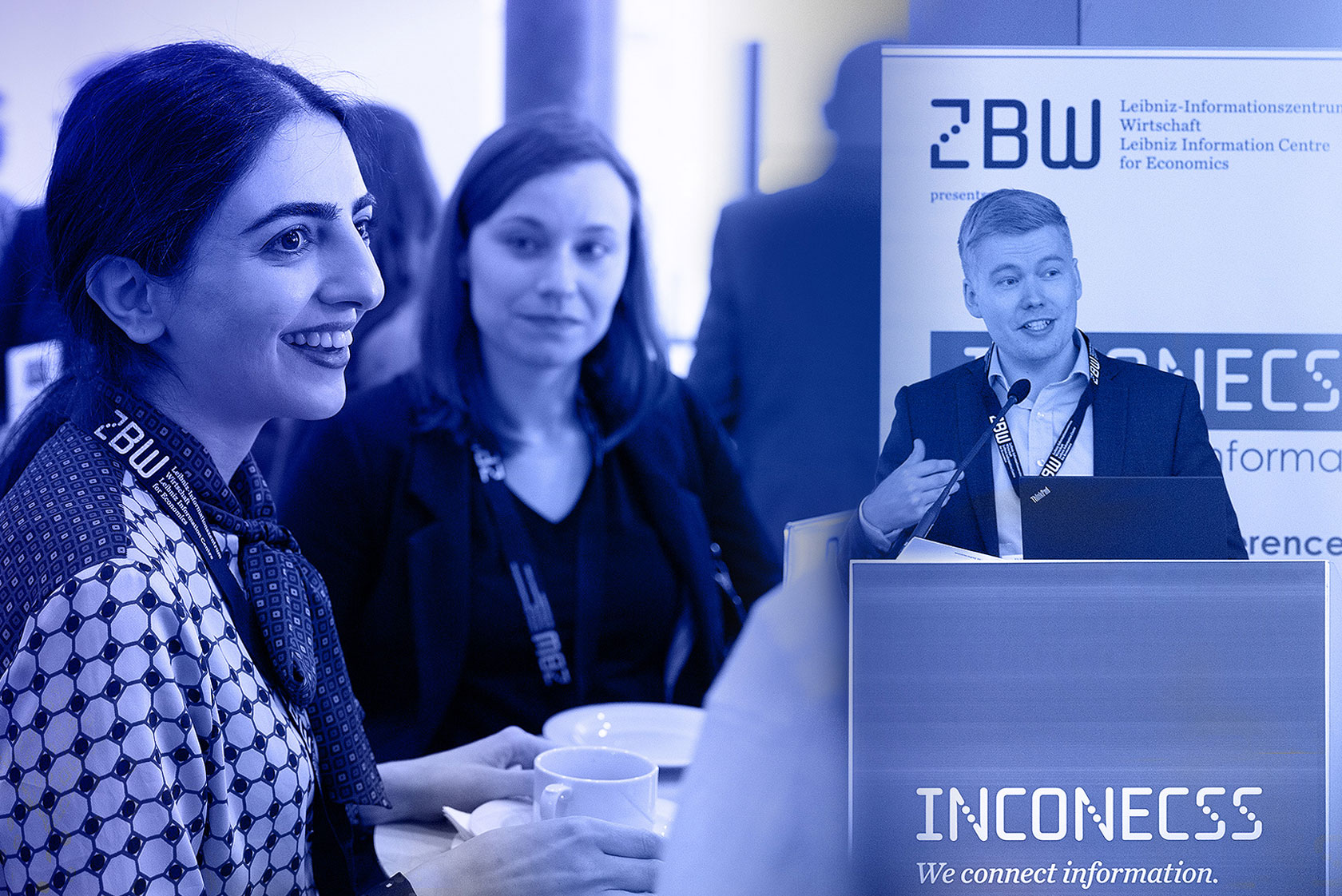
INCONECSS 2022 Conference: Artificial Intelligence, Open Access and Data Dominate the Discussions
INCONECSS is the international conference for librarians and information specialists in the economic sciences. Held every three years, this year's conference focused on the extent to which the pandemic has changed the library world, what makes a modern infrastructure institution online and offline and, above all, how libraries can be made future-proof. Anastasia Kazakova attended the event and presents a review of the most important topics.
by Anastasia Kazakova

The third INCONECSS – International Conference on Economics and Business Information – took place online from 17 to 19 May 2022. The panels and presentations focused on artificial intelligence, Open Access and (research) data. INCONECSS also addressed collaboration in designing services for economics research and education and how these may have been influenced by the corona crisis.
Unleash the future and decentralise research!
Prof. Dr Isabell Welpe, Chair of Business Administration – Strategy and Organisation at the Technical University of Munich, gave the keynote address “The next chapter for research information: decentralised, digital and disrupted”. With this, she wanted to inspire the participants to “unleash the future” and decentralise research. The first topic of her presentation was about German universities. Isabell Welpe took us on a journey through three stations:
- What happens at universities?
- What does the work of students, researchers and teachers and the organisation at universities look like?
- How can universities and libraries be made future-proof?
In her lecture, she pointed out that hierarchically organised teaching is currently often unable to cope with the rapid social changes and new developments in the world of work. Isabell Welpe therefore suggested opening up teaching and organising it “bottom up”. This means relying on the decentralised self-organisation of students, offering (digital) spaces for exchange and tailoring teaching to their needs. Through these changes, students can learn while actively participating in research, which simultaneously promotes their creativity and agility. This is a cornerstone for disruptive innovation; that is, innovation that breaks and radically changes existing structures.
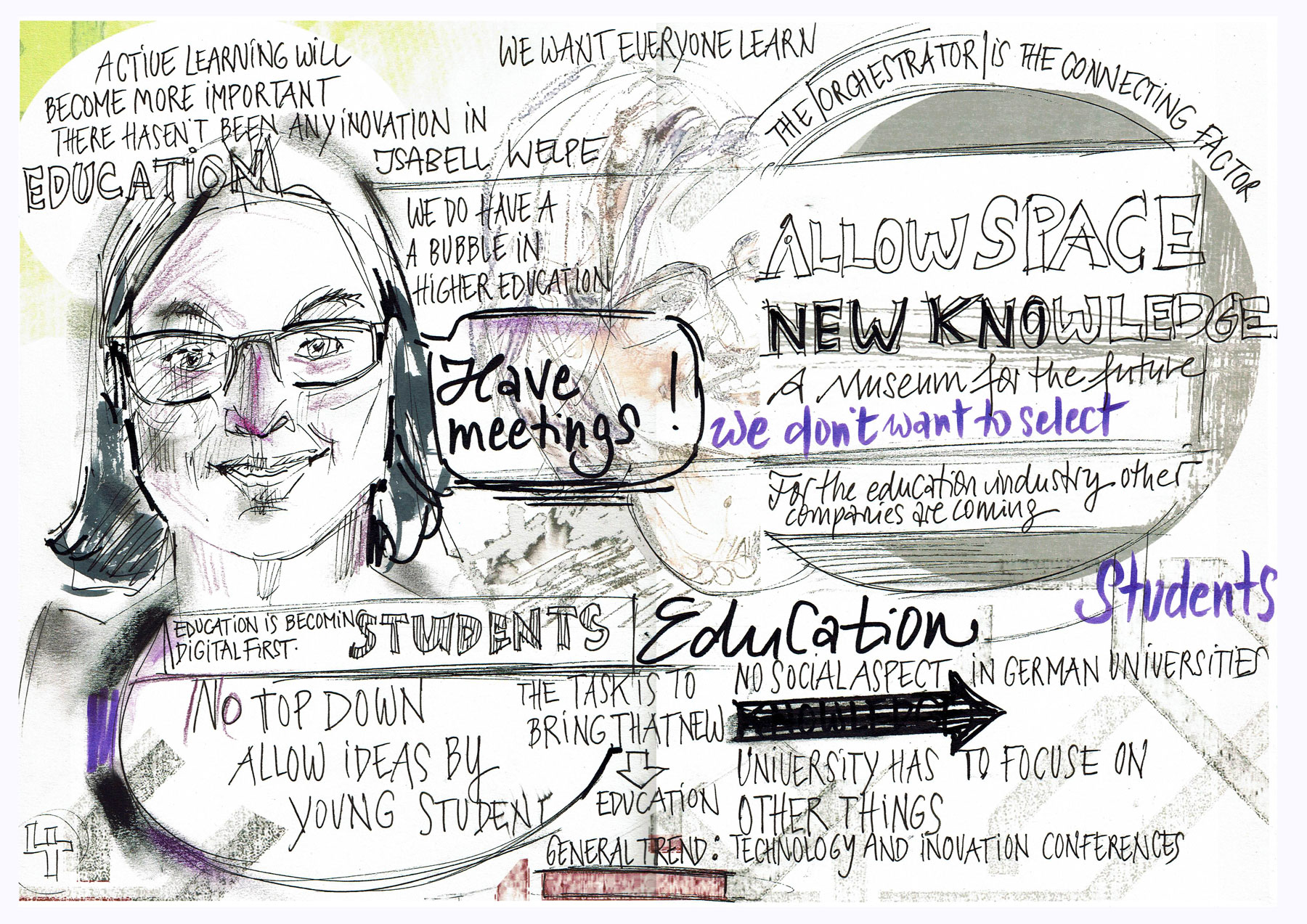
Prof. Dr Isabell Welpe, Chair of Business Administration – Strategy and Organisation at the Technical University of Munich, drawing: Karin Schliehe
Libraries could support and even drive the upcoming changes. In any case, they should prepare themselves for enormous changes due to the advancing digitisation of science. Isabell Welpe observed the trend towards “digital first” in teaching – triggered by the coronavirus situation. In the long term, this trend will influence the role of libraries as places of learning, but will also determine interactions with libraries as sources of information. Isabell Welpe therefore encouraged libraries to become a market-place in order to promote exchange, creativity and adaptability. The transformation towards this is both a task and an opportunity to make academic libraries future-proof.
In her keynote speech, Isabell Welpe also focused on the topic of decentralisation. One of the potentials of decentralisation is that scientists exchange data directly and share research data and results with each other, without, for example, publishers in between. Keywords were: Web 3.0, Crypto Sci-Hub and Decentralisation of Science.
In the Q&A session, Isabell Welpe addressed the image of libraries: Libraries could be places where people would go and do things, where they would exchange and would be creative; they could be places where innovation took place. She sees libraries as a Web 3.0 ecosystem with different services and encouraged them to be more responsive to what users need. Her credo: “Let the users own a part of the library!”
How can libraries support researchers?
Following on from the keynote, many presentations at INCONECSS dealt with how libraries can succeed even better in supporting researchers. On the first day, Markus Herklotz and Lars Oberländer from the University of Mannheim presented their ideas on this topic with a Poster (PDF, partly in German). The focus was on the interactive virtual assistant (iVA), which enables data collaboration by imparting legal knowledge. Developed by the BERD@BW and BERD@NFDI initiatives, the iVA helps researchers to understand the basic data protection regulations in each case and thereby helps them to evaluate their legal options for data use. The selfdirected assistant is an open-source learning module and can be extended.
Paola Corti from SPARC Europe introduced the ENOEL toolkit with her poster (PDF). It is a collection of templates for slides, brochures and Twitter posts to help communicate the benefits of Open Education to different user groups. The aim is to raise awareness of the importance of Open Education. It is openly designed, available in 16 language versions and can be adapted to the needs of the organisation.
On the last day of INCONECSS, Franziska Klatt from the Economics and Management Library of the TU Berlin reported in her presentation (PDF) on another toolkit that supports researchers in applying the Systematic Literature Review (SLRM) method. Originating from the medical field, the method was adapted to the economic context. SLRM helps researchers to reduce bias and redundancy in their work by following a formalised and transparent process that is reproducible. The toolkit provides a collection of information on the stages of this process, as well as SLR sources, tutorial videos and sample articles. Through the use of the toolkit and the information on the associated website, the media competence of the young researchers could be improved. An online course is also planned.
Field reports: How has the pandemic changed the library world?
The coronavirus is not yet letting go of the world, which also applies to the world of the INCONECSS community: In the poster session, Scott Richard St. Louis from the Federal Reserve Bank of St. Louis presented his experiences of onboarding in a hybrid work environment. He addressed individual aspects of remote onboarding, such as getting to know new colleagues or the lack of a physical space for meetings.
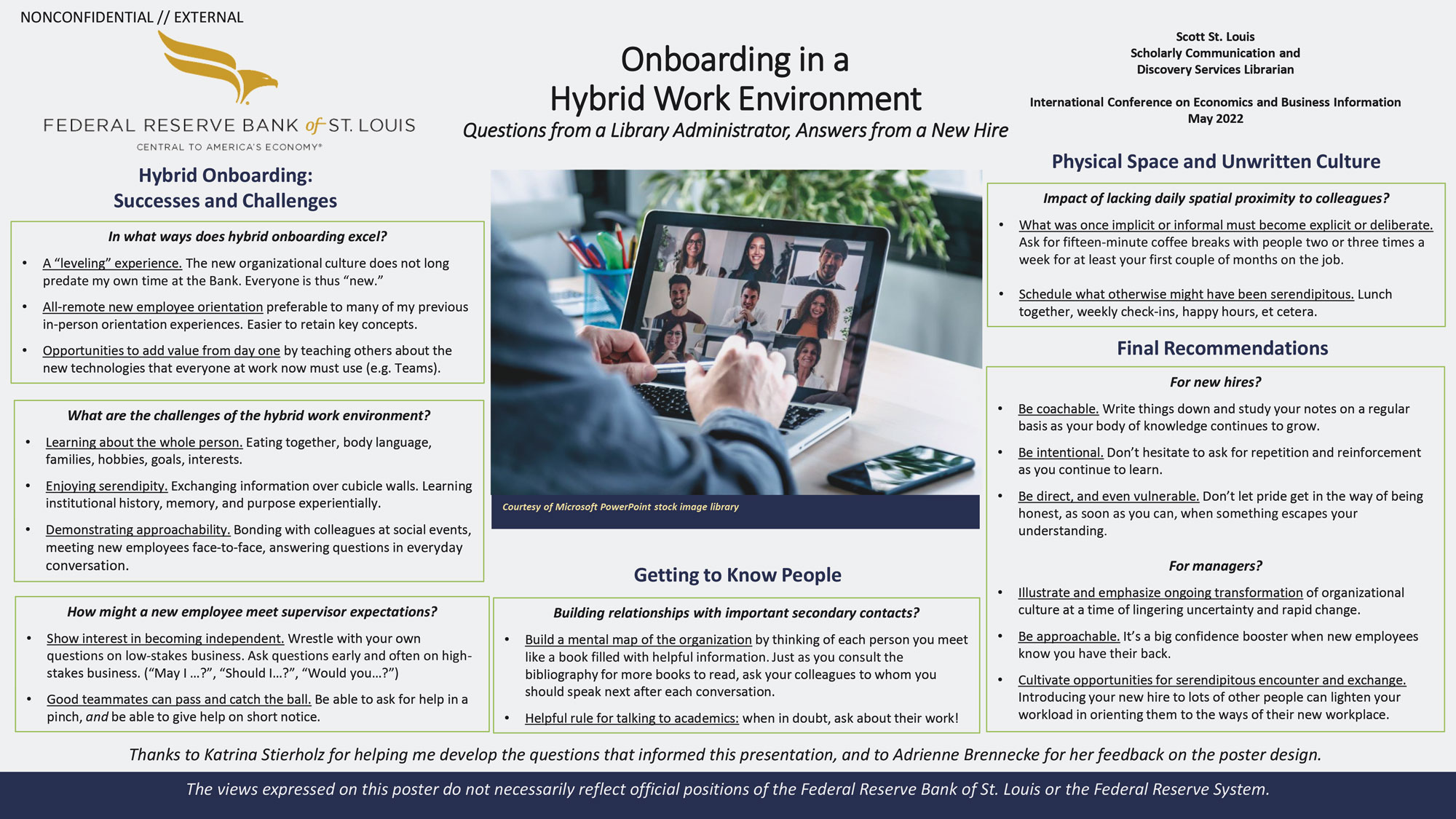
Onboarding in a Hybrid Work Environment: Questions from a Library Administrator, Answers from a New Hire by Scott Richard St. Louis (Video)
The poster (PDF) is worth a look, as it contains a number of suggestions for new employees and management, e.g.:
- “Be direct, and even vulnerable”,
- “Be approachable” or
- “What was once implicit or informal needs to become explicit or conscious”.
Arjun Sanyal from the Central University of Himachal Pradesh (CUHP) reported in his presentation (PDF) on a project of his library team. They observed that the long absence from campus triggered a kind of indifference towards everyday academic life and an “informational anxiety” among students. The latter manifests itself in a reluctance to use information resources for studying, out of a fear of searching for them. To counteract this, the librarians used three types of measures: Mind-map sessions, an experimental makerspace and supportive motivational events. In the mind-map session, for example, the team collected ideas for improving library services together with the students. The effort had paid off, they said, because after a while they noticed that the campus and the libraries in particular were once again popular. In addition, Makerspace and motivational events helped students to rediscover the joy of learning, reports Arjun Sanyal.
Artificial Intelligence in Libraries
One of the central topics of the conference was without doubt the use of artificial intelligence (AI) in the library context. On the second day of INCONECSS, the panel participants from the fields of research, AI, libraries and thesaurus/ontology looked at aspects of the benefits of AI for libraries from different perspectives. They discussed the support of researchers through AI and the benefits for library services, but also the added value and the risks that arise through AI.
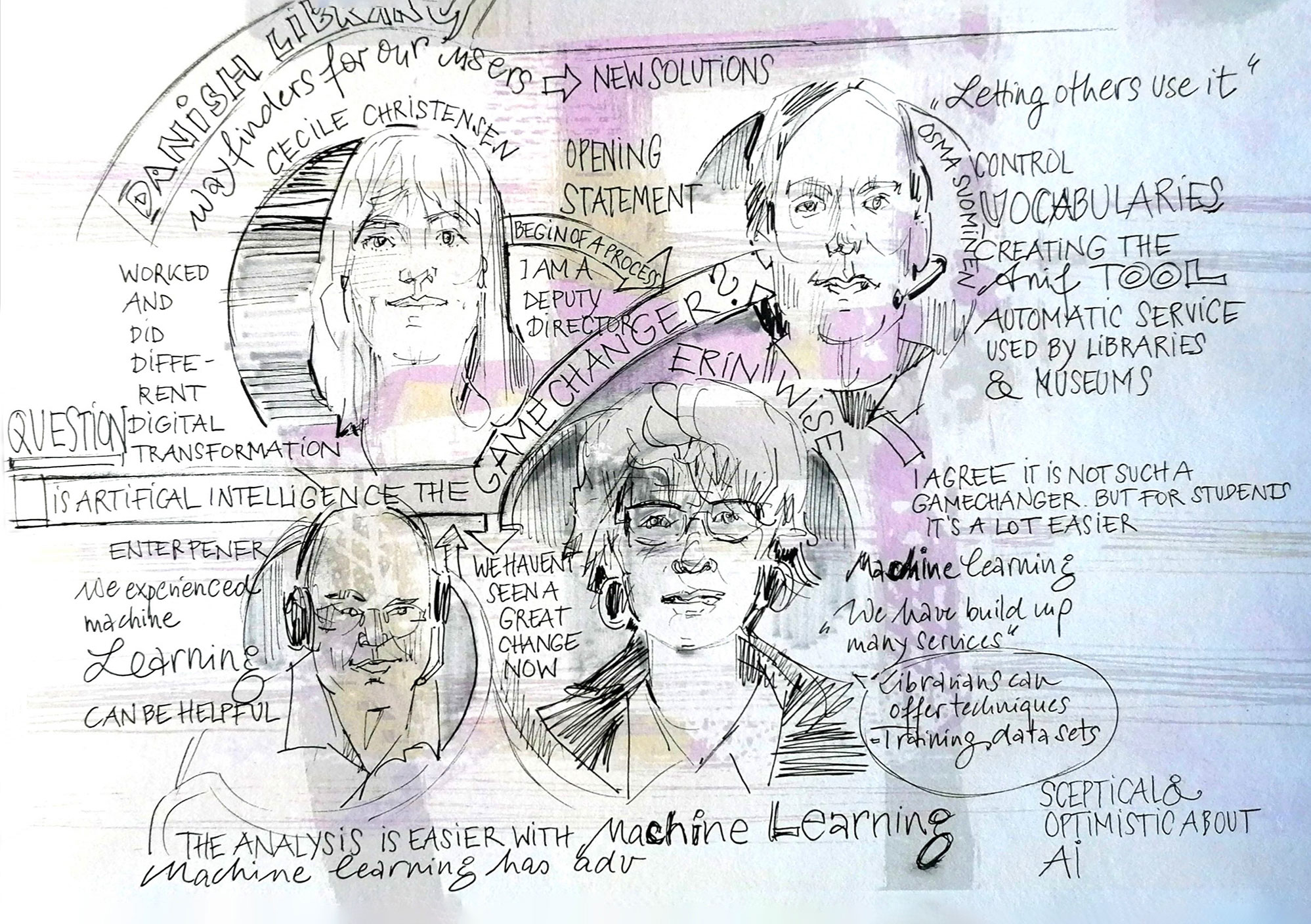
Discussion, drawing: Karin Schliehe
The panellists agreed that new doors would open up through the use of AI in libraries, such as new levels of knowledge organisation or new services and products. In this context, it was interesting to hear Osma Suominen from the National Library of Finland say that AI is not a game changer at the moment: it has the potential, but is still too immature. In the closing statements, the speakers took up this idea again: They were optimistic about the future of AI, yet a sceptical approach to this technology is appropriate. It is still a tool. According to the panellists, AI will not replace librarians or libraries, nor will it replace research processes. The latter require too much creativity for that. And in the case of libraries, a change in business concepts is conceivable, but not the replacement of the institution of the library itself.
It was interesting to observe that the topics that shaped the panel discussion kept popping up in the other presentations at the conference: Data, for example, in the form of training or evaluation data, was omnipresent. The discussants emphasised that the quality of the data is very important for AI, as it determines the quality of the results. Finding good and usable data is still complex and often related to licences, copyrights and other legal restrictions. The chatbot team from the ZBW also reported on the challenges surrounding the quality of training data in the poster session (PDF).
The question of trust in algorithms was also a major concern for the participants. On the one hand, it was about bias, which is difficult and requires great care to remove from AI systems. Again, data was the main issue: if the data was biased, it was almost impossible to remove the bias from the system. Sometimes it even leads to the systems not going live at all. On the other hand, it was about the trust in the results that an AI system delivers. Because AI systems are often non-transparent, it is difficult for users and information specialists to trust the search results provided by the AI system for a literature search. These are two of the key findings from the presentation (PDF) by Solveig Sandal Johnsen from AU Library, The Royal Library and Julie Kiersgaard Lyngsfeldt from Copenhagen University Library, The Royal Library. The team from Denmark investigated two AI systems designed to assist with literature searches. The aim was to investigate the extent to which different AI-based search programmes supported researchers and students in academic literature search. During the project, information specialists tested the functionality of the systems using the same search tasks. Among other results, they concluded that the systems could be useful in the exploratory phase of the search, but they functioned differently from traditional systems (such as classic library catalogues or search portals like EconBiz) and, according to the presenters, challenged the skills of information specialists.
This year, the conference took place exclusively online. As the participants came from different time zones, it was possible to attend the lectures asynchronously and after the conference. A selection of recorded lectures and presentations (videos) is available on the TIB AV portal.
Links to INCONECSS 2022:
- Programme INCONECSS
- Interactive Virtual Assistant (iVA) – Enabling Data Collaboration by Conveying Legal Knowledge: Abstract and poster (PDF)
- ENOEL toolkit: Open Education Benefits: Abstract and poster (PDF)
- Systematic Literature Review – Enhancing methodology competencies of young researchers: Abstract and slides (PDF)
- Onboarding in a Hybrid Work Environment: Questions from a Library Administrator, Answers from a New Hire: Abstract and Poster (PDF)
- Rethinking university librarianship in the post-pandemic scenario: Abstract and slides (PDF)
- „Potential of AI for Libraries: A new level for knowledge organization?“: Abstract Panel Discussion
- The EconDesk Chatbot: Work in Progress Report on the Development of a Digital Assistant for Information Provision: Abstract and slides (PDF)
- AI-powered software for literature searching: What is the potential in the context of the University Library?: Abstract and slides (PDF)
This might also interest you:
- INCONECSS 2019: A Look Into the Future of Economics and Business Libraries
- Discrimination Through AI: To What Extent Libraries are Affected and how Staff can Find the Right Mindset
- Hackathon Coding.Waterkant: How to Improve Library Services Through Chatbots and Artificial Intelligence
Anastasia Kazakova is a research associate in the department Information Provision & Access and part of the EconBiz team at the ZBW – Leibniz Information Centre for Economics. Her focus is on user research, usability and user experience design, and research-based innovation. She can also be found on LinkedIn, ResearchGate and XING.
Potrait: Photographer: Carola Grübner, ZBW©
View Comments
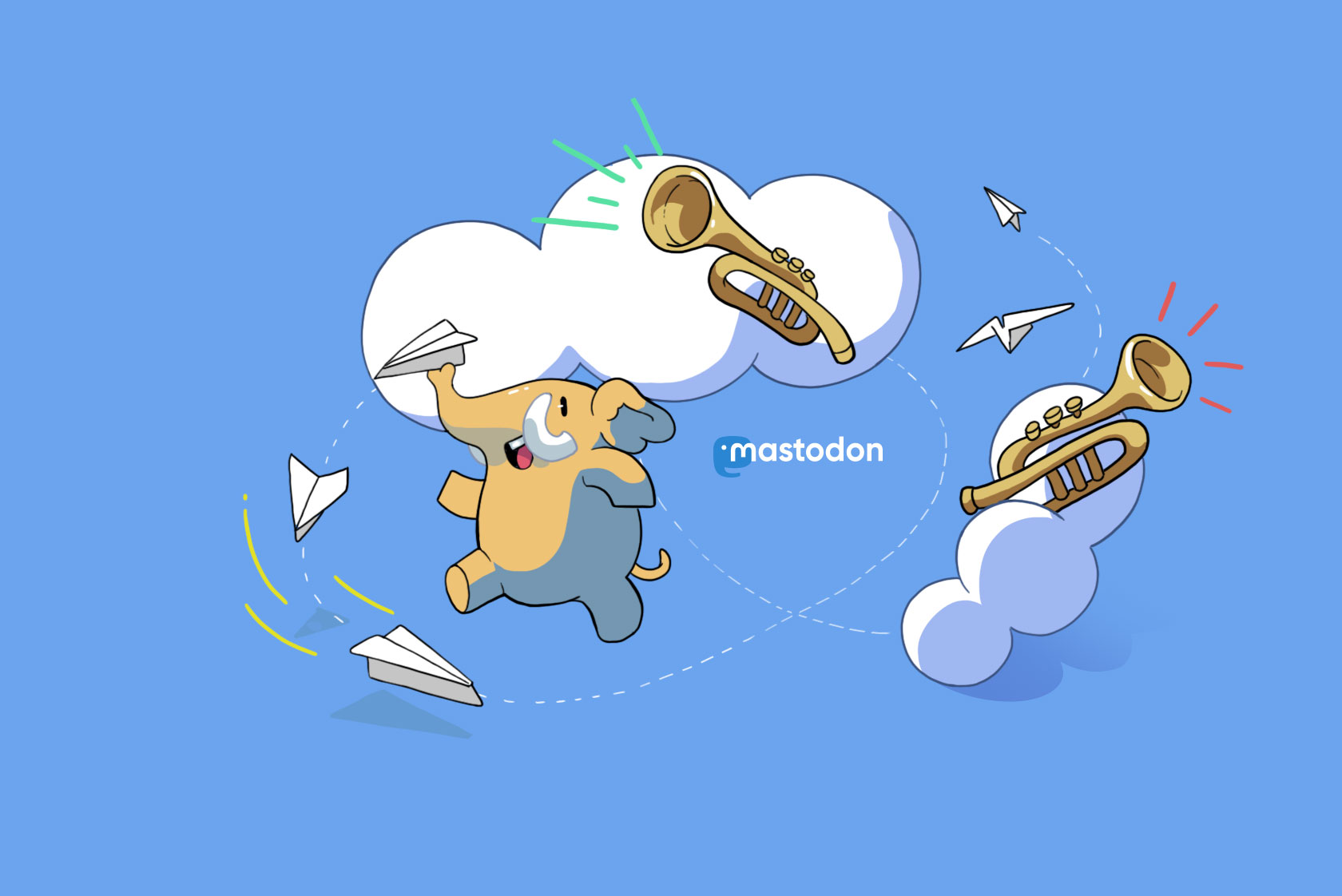
Briefly Noted: ZBW MediaTalk in Test Mode on Mastodon
Even though the purchase of Twitter by Elon Musk is now a case for lawyers, many...



